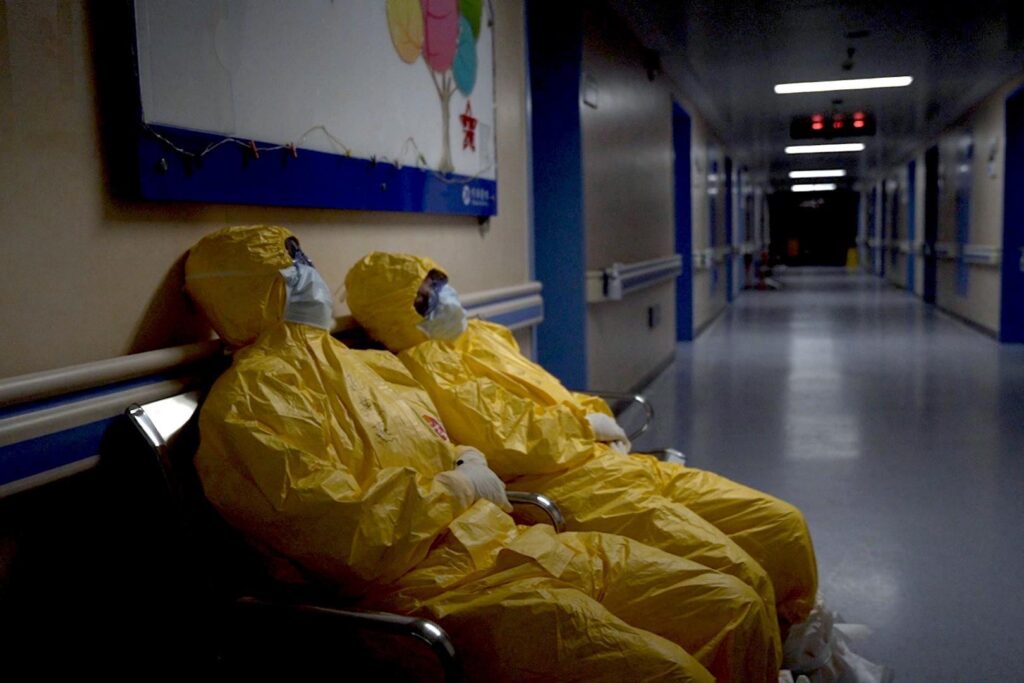Read also:
How to Watch FX Live Without CableHow To Watch AMC Without CableHow to Watch ABC Without CableHow to Watch Paramount Network Without CableHao Wu’s fly-on-the-wall glimpse of China’s 76-day coronavirus lockdown is a startling portrait of resilience and helplessness.
(This review is part of our coverage of AFI Fest 2020.)
It’s blood-curdling to think we’ve been dealing with the coronavirus on a global level for nearly ten months now. Over one million are dead at last reckoning, more than 200,000 of which inside the borders of the United States (chiefly thanks to all-but-nonexistent pandemic response from an incompetent, uncaring Trump administration). This long into the pandemic, a sense of normalcy has definitely kicked in, whether you’ve internalized social distancing and mask mandates, or if you (idiotically) think these precautions are an overreaction. 76 Days, a new documentary from Hao Wu and co-directed by Weixi Chen and Anonymous, is a startling reminder of how this all started, and how bad things can still get if we don’t get our acts together.
Charting life at a Wuhan hospital during the city’s 76-day lockdown, 76 Days chronicles the efforts of frontline doctors and hospital workers to deal with the sudden influx of COVID patients, young and old, as they grapple with the scope of the pandemic and try their best to care for a scared populace with nowhere to turn.
The opening minutes, much like the ninety that follow, are jaw-dropping in their rawness and immediacy. A medical worker in a hazmat suit dashes to the room where her father has just died of COVID, wailing and struggling against the other workers who are holding her back. Even in grief, the other workers beg her to “control herself” because they have so many other people to help. For the rest of the film, we’ll see many more instants like this, great and small, as medical workers and patients alike grapple with the enormity of the disease they must battle.

Wu et al.’s documentary rejects a traditional narrative structure to merely let us exist within the confines of this hospital, reflecting the timeless limbo that COVID patients and their caretakers go through. Isolated moments hammer home the desperation of patients: a close-up of a door handle jiggling as a lobby overstuffed with patients tries to rush in, an infected woman in labor begs to let her uninfected husband keep her company. Among these vignettes, a few recurring storylines take shape: an old man with dementia who keeps trying to sneak out, a young couple anxiously awaiting the moment they can take their newborn baby home once the mother recovers from COVID.
All of these moments coalesce into a unified portrait of collective grief, the heavy burden medical workers face when dealing with an unprecedented disease and a public as terrified as they are. Through the masks and face shields, though, we see a hopeful sense of resilience forming. Wu et al. take great care to highlight the stalwart efforts of these workers to keep people calm, to administer needed care while also acting as the only human contact these people (many of whom are elderly) will have for weeks. “Your family is not here,” one doctor tells a patient. “We’re your family right now.”
Sometimes, 76 Days‘ disinterest in cohering these disparate scenarios into an all-encompassing narrative makes the affair feel formless, as if we’re merely capturing what’s going on right now instead of synthesizing it into a broader statement. But there’s something gripping about viewing a global disaster through the eyes of the small, human moments that comprise it — the cute faces and encouraging slogans (“Clay Pot Chicken, I Miss You”) scribbled on workers’ hazmat suits to break up the suffocating weight of their work, a worker attempting to pull the bracelet off a dead woman’s swollen hand so she can return it to the family.
Through the masks and face shields, though, we see a hopeful sense of resilience forming.
There’s very little editorializing, particularly in the political dimension of the virus response. A friend tells his sick friend over the phone that he needs to remember he’s “a [Chinese Communist] Party member” and he should listen to his doctors for the good of all, but that’s about the extent of it. Instead, the filmmakers turn their attention not to China’s woeful governmental response, but to the inimitable bravery of the nation’s healthcare workers, who are a credit to their profession and humanity as a whole.
“Rich or poor, beloved or despised, nobody can escape,” one medical worker admits solemnly, sanitizing the phones of the dead so they can be heartbreakingly returned to their next of kin. 76 Days‘ formlessness curiously works to its benefit, capturing the numbness we’ve all felt these last ten months as death becomes an ever-more-immediate part of our daily lives.
For so many of us, whether in lockdown or the ICU, time has no meaning in 2020; all we can do is pay close attention when something shocks us into consciousness. Whether it’s the first time we share a meal with our spouse again or the tears of a medical worker making phone call after phone call informing families that Grandma isn’t here anymore, this film is a call to remember the people we’ve lost, and the ways we need to weather through these troubling times with compassion and humanity.